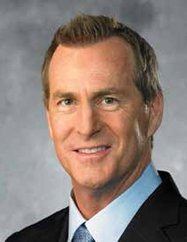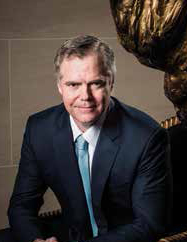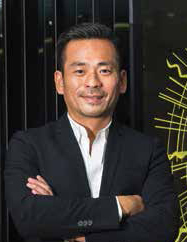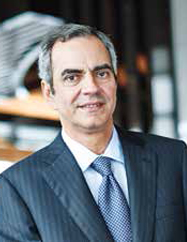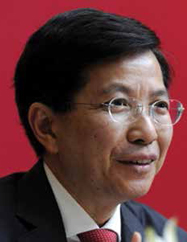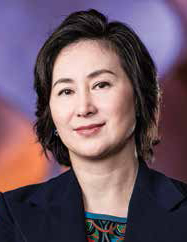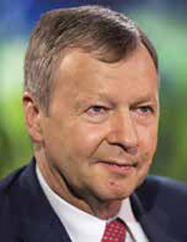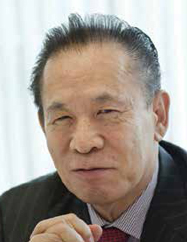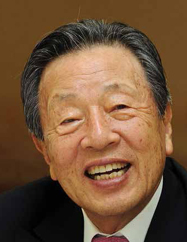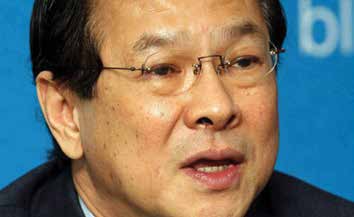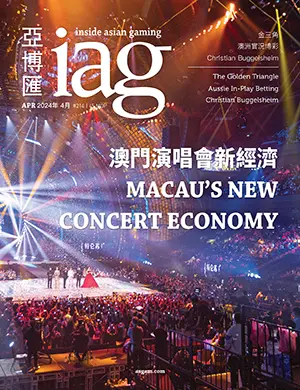[1-10] [11-20] [21-30] [31-40] [41-50]
Kelley’s appointment was a nod to Galaxy’s evolution from a VIP reliant business to mass market, with the company stating at the time that, “Mr Kelley will oversee functions such as business development, international premium and mass market development, Galaxy Macau, StarWorld Hotel, Broadway Macau and City Clubs operations as well as advancing the development plans for Phases 3 and 4.”
Certainly he seems the right man for the job. Kelley’s 40 years of industry experience has been very much centered around the mass market with his previous roles including Senior Vice President of Operations at Las Vegas Sands – where he helped open Cotai’s first integrated resort, the Venetian Macao, in 2007 – as well as various senior positions with Station Casinos in Nevada.
The early signs are encouraging, too. Revenues from the mass market segment for GEG in 2Q16 grew by an impressive 29% year-on-year, helping total revenue rise 4% to HK$12.2 billion.
Union Gaming analyst Grant Govertsen said Galaxy, under Kelley’s direction, “seems to be hitting its stride with respect to getting the mass story right at the right time with an increased focus on non-premium mass.
“Significant reconfigurations of both Galaxy’s and StarWorld’s mass market floors post-2Q16 suggest we should see continued follow through into 3Q and should provide a good defense against new supply.”
Kelley was handed a difficult assignment given the state of the Macau market at the time of his appointment, however it is clear that GEG Deputy Chairman Francis Lui sees him as the man to move the company forward.
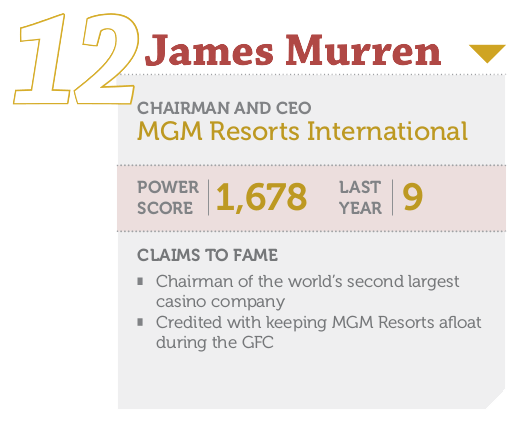
MGM China holds the smallest piece of the Macau pie among the city’s six concessionaires, with 9.1% of market share according to the latest numbers and less than 500 of its 5,998 gaming tables.
It is also suffering from a shortage of hotel rooms with just 582 at MGM Macau – a situation not helped by the recent announcement that MGM Cotai would delay its opening until 2017.
Nevertheless, MGM Macau has long been a major revenue source for MGM Resorts – contributing, at its 2014 peak, as much as 32% of the total revenue generated by properties under the MGM Resorts umbrella. Even now it comprises just over 22%.
Much of the credit for the success MGM Resorts has enjoyed from its Macau operations can be attributed to Chairman and CEO Jim Murren.
In 2011 he engineered a deal with fellow stakeholder Pansy Ho to give MGM Resorts a controlling interest in the Macau operation, with the added revenue playing its role in the company’s overall recovery following some difficult years during the Global Financial Crisis.
Last month, MGM Resorts raised its stake again by acquiring another 4.95% of MGM China Holdings from Ms Ho – taking its total stake to 56%.
“We believe in the future of the Macau marketplace and are confident in the success of MGM China as we expand into Cotai next year,” Murren explained.
In the meantime, however, MGM Cotai’s main role has been to provide a backdrop to the glitzy openings of its neighbors with both Wynn Palace and the Parisian welcoming their first customers in 3Q16.
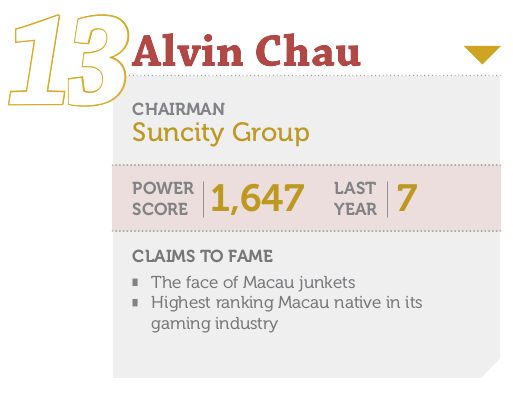
The junket business in Macau has declined by more than 50% since its 2013 peak and shows no sign of a turnaround. In the second quarter, Macau’s Gaming Inspection and Coordination Bureau (DICJ) reported second quarter VIP revenue fell 16.7% from last year; that was the sector’s best performance in two years.
Union Gaming analyst Grant Govertsen expects VIP revenue to decline for the rest of this year and by another 4% next year, “biased to the downside.” The Union report published last month estimates that the three largest Macau junkets, Suncity, Neptune/Guangdong and Tak Chun, control 80% of the market, up from 45% to 55% during the good times. Suncity alone may have a 50% market share, which would give it gross commission revenue in the neighborhood of US$90 million. Union says the top three promoters are increasingly poaching agents from smaller junkets. In the long run, that may provide greater leverage with casino operators, though given Macau’s tax rate and 1.25% commission cap, any gains will be marginal.
More broadly, Suncity has extended its reach as a full-service travel, wealth management services provider promoting an aspirational lifestyle, embodied by Mr Chau. On Suncity’s website, visitors can secure a VIP room seat in Macau, Melbourne, Manila or Seoul, book a trip to Wimbledon or the Suncity sponsored Macau Grand Prix and even rent a yacht.
The Union Gaming report highlights junkets’ efforts to move into casino ownership. Suncity is a minority partner in the Hoi An South integrated resort project along Vietnam’s central coast. In an interview last year, Mr Chau told Inside Asian Gaming he’d like to have a chain of “boutique casino resorts” across Asia. A rival executive chuckled, “Who wouldn’t?”
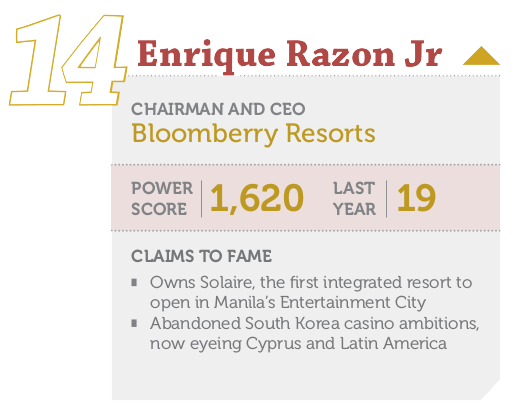
And while his fortune was made in ports services, it is clear he has similarly global ambitions when it comes to gaming.
First it was South Korea, where Bloomberry Resorts – the Philippines listed vehicle for Mr Razon’s gaming interests – acquired land in Incheon and spent US$100 million on a casino hotel in Jeju, South Korea’s leading domestic vacation destination with visa-free entry for mainland Chinese. For Bloomberry, Korea seemed like a natural fit, since it’s the largest source of visitors to the Philippines. But Korea remained committed to foreigners-only casinos outside remote Kangwon Land, cooling feverish interest in the market.
Early last year, Bloomberry was one of more than 30 applicants expressing interest in a Korean IR, but by late last year actual applicants had dwindled to a handful, Bloomberry not among them. Its Jeju Sun casino reopened a year ago, made steady losses and, in June, was sold to Iao Kun Group, a Macau junket promoter listed on NASDAQ.
Next up, Cyprus, where Bloomberry, Lawrence Ho’s Melco International and Cambodia’s NagaCorp are bidding to create Europe’s first modern integrated resort in a tourist destination. Beyond that, Mr Razon recently told World Gaming Group – owner of IAG – that, “South America is still the market that interests us the most, specifically Argentina. Buenos Aires is a big gaming market with no integrated resorts yet, so that will be one place we are eyeing.”
As for Solaire, Mr Razon says it will expand as local casino revenue does. Phase 2 will include “more gaming, probably three more hotel towers, the centrepiece of which will be a very large mall, and an 18,000 seat arena.”
While spanning the globe, Mr Razon surely wants to stay ahead at home.
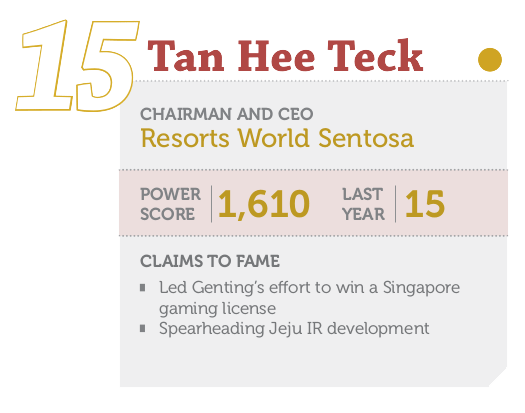
The US$5.7 billion IR has become Genting Group’s signature property, accounting for 40% of its revenue and 46% of EBITDA last year. But Singapore’s casino has proven vulnerable to China’s slowing economy and anti-corruption campaign, with gaming revenue and EBITDA each down 21% last year. Gaming revenue fell another 15% in the first half of this year, with EBITDA off 29% amid weakening margins. One good sign is the stabilization of non-gaming revenue, aided by last year’s opening of the 557 room Jurong Hotel – built a 15 minute drive away because there’s no room to expand on Sentosa. Still, the performance gap between RWS and crosstown rival Marina Bay Sands keeps widening.
The group’s quest for growth has Mr Tan overseeing construction of US$1.8 billion Resorts World Jeju, a joint venture with mainland China developer Landing International. RW Jeju follows the RW Sentosa playbook, aiming to capitalize on the popular resort island’s visa-free entry for mainland Chinese while offering a theme park and other non-gaming attractions for Koreans barred from the casino, including a theme park based on global heroes and legends.
But Korea is also suffering from declining Chinese play, so RW Jeju’s financial impact will likely be marginal. Its best hope for growth in Asia remains casino legalization in Japan – and Mr Tan is Genting’s leading man on that front.
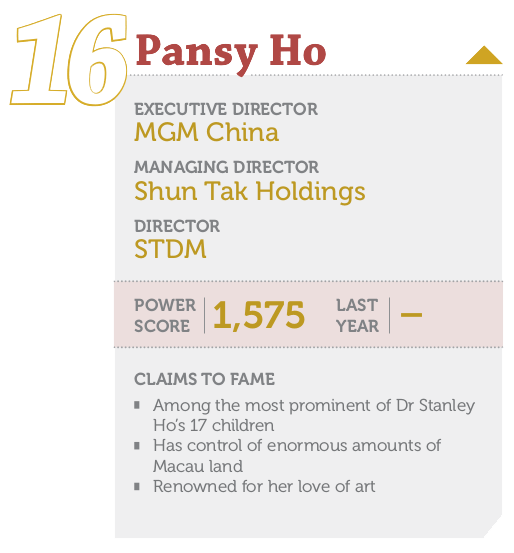
This is an interesting time for Ms Ho. In 2011, a bitter family feud between her and Dr Ho’s fourth wife Angela Leong saw a temporary truce called, with Ms Ho remaining a director of STDM while Ms Leong was given a guaranteed role as Executive Director of SJM for six years. That six year guarantee expires in early 2017, potentially opening the door for Ms Ho to launch a power play and steal control of SJM back from Ms Leong.
In the meantime, Ms Ho continues to play a significant role at MGM China Holdings, which will open its second Macau property, MGM Cotai, next year. She is also Managing Director of Shun Tak, one of Macau’s biggest land owners and parent company to Artyzen Hospitality Group which owns Grand Lapa.
Ms Ho’s influence in Macau is in fact greater than she is often given credit for and in many ways she has become an elder stateswoman for the local industry. Renowned for her love of art, she has spoken often about the need for diversification while in Asia’s English-speaking business world she is widely considered to be a person of considerable authority.
Nevertheless, these next 12 months promise to be the most telling of all for Ms Ho. Although she has taken a back seat for the past five years in relation to her father’s empire, that could all be about to change and if she does oust Ms Leong at SJM, the power she wields will shoot through the roof.
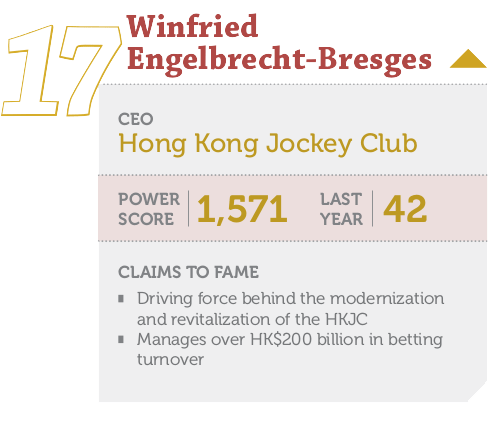
Despite the dip in turnover, the first in seven years, the 2015-16 season generated the second-best volumes in HKJC history. That’s good news for the city of Hong Kong. The Jockey Club, which is run as a non-profit, is the city’s largest taxpayer and benefactor of charitable and community causes.
Certainly it’s hasn’t dimmed the success Engelbrecht-Bresges has enjoyed in revitalizing Hong Kong racing and leading it confidently into the 21st century.
Nearly one-quarter of the world’s top 25 races are now run in Hong Kong. The club has had more than 20 horses in the world rankings in each of the last three seasons – up from the one it had when Engelbrecht-Bresges joined the club in 1998 as director of racing.
To ensure the streak continues, two high-profile stakes races will see their prizes boosted by a combined HK$6 million in 2016-17. Class racing prizes will rise more than 5% on average. In all, a record HK$1.1 billion-plus is scheduled to be awarded.
Commingling of wagering – bets placed on Hong Kong races from overseas – is “a key growth driver going forward,” as the CEO put it and took a huge step forward in 2014 when the United States was added as a partner. With the United Kingdom and Canada joining during the first half of this season, the club projects the commingling turnover to grow another 25% this year.
Engelbrecht-Bresges also gets high marks for his pursuit of closer ties with China. The strategy got into gear in 2014 with the opening of a betting venue in Beijing and has really taken off with the construction of a 150-hectare training center in the Conghua district of Guangdong province. It’s scheduled for completion in 2018.
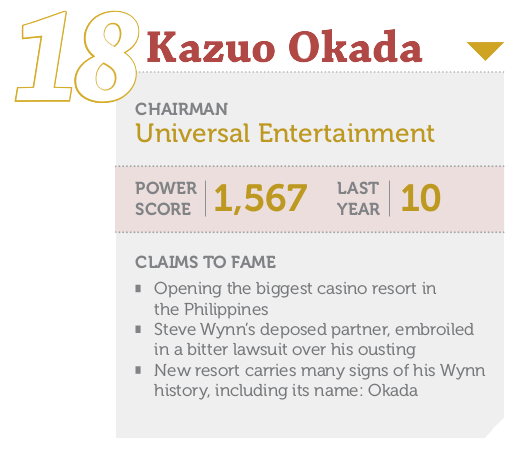
In fact, Okada the resort will be unlike anything in the Philippines to date, promises Tiger Resorts, the division of Mr Okada’s Tokyo listed Universal Entertainment that’s building it. Due to open in November, US$2.4 billion Okada will include Southeast Asia’s largest indoor beach, under a glass dome and doubling as a nightclub, plus nearly 1,000 rooms, 50 luxury shops and a casino with more than 500 tables and 3,000 machines.
“Okada Manila has the potential to compete with the entertainment and gaming giants from across the region with its best natural resources – its hospitality and warmth,” Tiger Resorts President Steve Wolstenholme, hired last year from Nevada, says.
“Here, expect an effortless integration of the Japanese Omotenashi – people’s respectful demeanor, passion for creativity and hunger for innovation – and the Filpinos’ hard work, hospitality and cheerful spirit.”
Tiger Chief Operating Officer Takahiro Usui, a trusted lieutenant from Mr Okada’s Aruze gaming machine division brought aboard this year, says that with subsequent phases, total investment on the 44 hectare (109 acre) bayfront site could reach US$4 billion. Success in Manila will give Mr Okada credibility for a license in Japan in the event of casino legalization.
The road to Okada’s opening has included accusations of bribery and violating Philippine land ownership laws, forfeiting a PHP100 million (US$2.2 million) performance bond for missing the completion deadline (moved to the end of this year) plus Mr Okada’s ousting from the Wynn corporate boards and cut-price redemption of his shares over issues rooted in his quest for a Philippine casino. The Wynn matter remains in litigation, with at least US$800 million at stake. However, simply opening the Manila resort in a buoyant gaming market will represent a victory for Mr Okada.
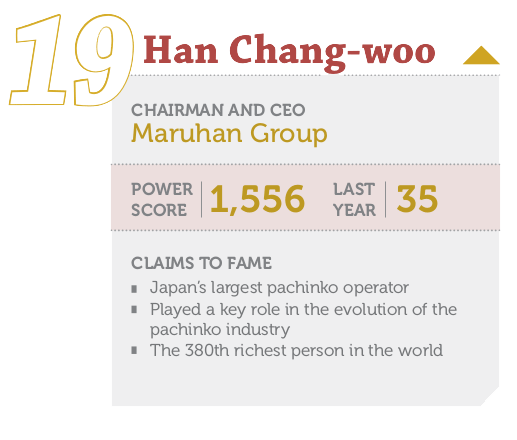
Yet even accounting for the decline, the pachinko industry is worth almost almost US$200 billion a year – the biggest slice of which belongs to Han Chang-woo’s Maruhan Group.
With 315 pachinko parlors across Japan – up from 308 last year – Maruhan Group accounts for more than 10% of the nation’s pachinko market with an army of 12,482 employees as of March 2016.
Mr Han’s personal fortune sits around the US$4 billion mark thanks to a combination of foresight and good timing, making him the sixth richest person in Japan and 380th in the world. Having incorporated Maruhan in 1957, the now 85-year-old rode the nation’s pachinko wave through the 1960s and has survived the pachinko slump by re-inventing his company’s parlors to provide more diverse and attractive facilities.
That he is Korean-born has helped give Maruhan Group credibility, given past indiscretions by locals involved in the industry, and with a range of other projects currently in the works – including the long awaited US$2 billion Dream Island project on Korea’s Yeongjong Island – it is clear Mr Han has no intention of riding quietly off into the sunset.
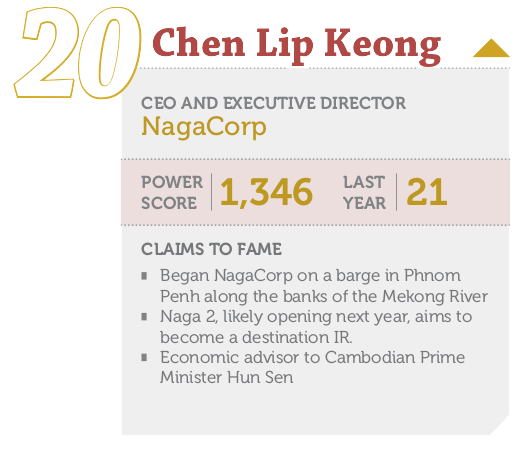
Amid Macau’s woes, flagship NagaWorld grew gaming revenue 26% last year to US$481 million and net profit rose 27% to US$173 million. VIP roll expanded 27.3% to nearly US$8 billion, thanks to an aggressive incentive program that paid junkets up to 90% of the win, based on their players’ roll, plus a reliance on relatively small players from across Asia, not just mainland China. For the first half ofthis year, gaming revenue rose 10%, VIP roll increased 26%, despite reducing the incentive program, and net profit grew 24%.
Last month NagaCity Walk had a soft opening, the latest piece in transforming NagaWorld into a regionally, if not globally, competitive integrated resort. Operated by China Duty Free Group and designed by Paul Steelman, the new 18,000 square meter (192,000 square foot) retail mall will link NagaWorld, with 296 tables, 1,662 machines and 700hotel rooms, to Naga 2, expected to open next year with up to 300 tables,500 machines, 37 VIP salons, 1,000 guest rooms, many of them VIPsuites with in-room gaming, a 2,100 seat theater and meeting space. Dr Chen personally financed both new projects, at a cost of nearly US$500 million, for transfer to NagaCorp via convertible bonds.
Construction proceeds on NagaCorp’s US$150 million casino hotel in Vladivostok, and it’s in good company bidding on the gaming license in Cyprus, challenging Lawrence Ho’s Melco International and Enrique Razon’s Bloomberry.



